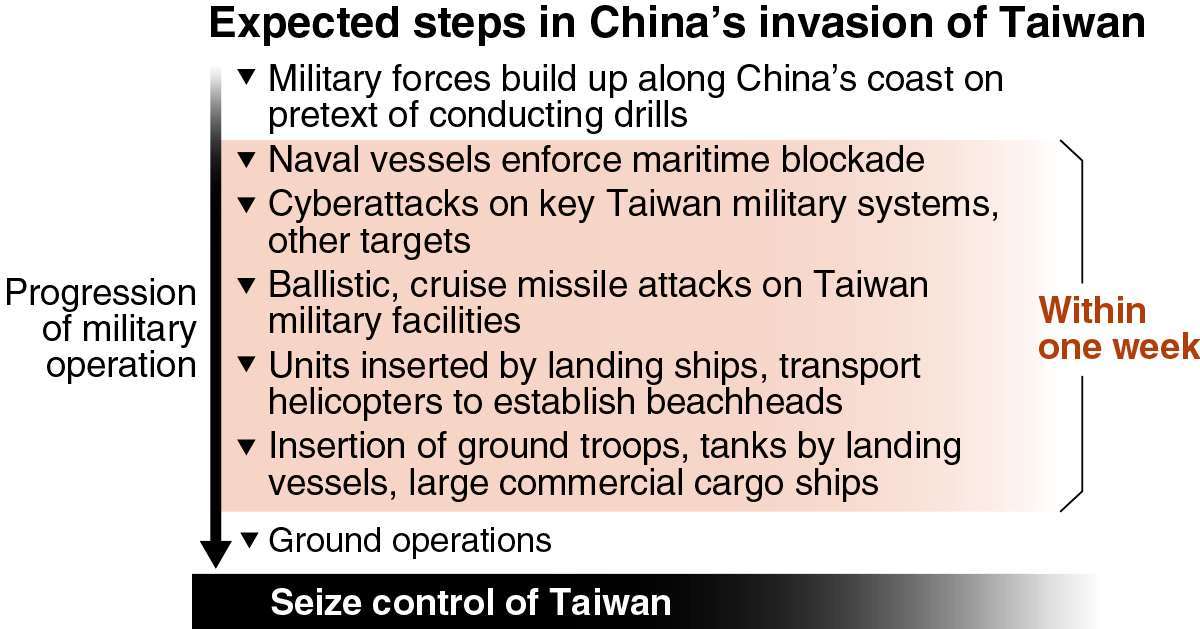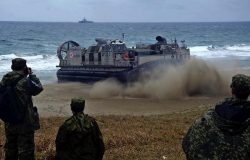Japan Govt Predicts China’s Forces Could Land on Taiwan Within 1 Week of Enforcing Blockade; Drills Conducted in 2023 Analyzed

One of the four Coast Guard Vessels, which Taiwan says belongs to China and entered waters near frontline islands, sails on water, in this screengrab from a handout video, July 11, 2024.
15:21 JST, July 18, 2024
China’s military has the capability to land ground forces on Taiwan within as little as one week after imposing a naval blockade on the island, according to a Japanese government analysis of Chinese military exercises conducted last year.
The government had previously estimated Chinese forces would require about one month before putting troops ashore in an invasion of Taiwan, and it is increasingly concerned that the Chinese military is envisaging a very short military operation that would exploit the period before the U.S. military and other forces could respond to such an incident.
The findings were based on an analysis of Chinese military exercises that were conducted over about one month in the summer of 2023. These drills practiced maneuvers involving warships and other equipment, and missiles were launched at various locations within China and its nearby waters.
According to a senior Japanese government official, analysis of the series of exercises revealed that if various Chinese military units conducted operations in parallel, Beijing’s forces could land vast ground forces on Taiwan within a few days of imposing a maritime and air blockade around the island. The analysis findings were reported to Prime Minister Fumio Kishida early this year.
A Chinese invasion of Taiwan is predicted to begin with a maritime blockade enforced by naval vessels. This would be followed by missile attacks on Taiwan’s military facilities and the insertion of military units by landing ships and transport helicopters to establish beachheads, and then the insertion of troops and tanks by landing vessels and large commercial cargo ships.
Such an operation could run into difficulty in the face of counterstrikes from the Taiwan side and U.S. military intervention, so Chinese military forces apparently intend to seize control of the island before the United States’ main forces could get involved. It is possible China could attempt to delay any intervention involving U.S. and other forces by launching “hybrid warfare operations” that involve a combination of armed attacks and cyberattacks on vital infrastructure.

A key focus of attention will be on whether Japan, the United States and other nations could swiftly respond if China’s plans for a very short military operation play out in reality. Japan’s government also would need to take steps to ensure the protection of about 20,000 Japanese nationals in Taiwan and to evacuate residents from Okinawa Prefecture’s Sakishima Islands, which are geographically close to Taiwan.
The possible role of the Self-Defense Forces also will come into question. Based on security-related laws that came into effect in 2016, the government will need to consider whether a scenario in which China invades Taiwan constitutes a situation that has “an important influence on Japan’s peace and security,” during which the SDF can provide logistics support to U.S. ships, or a situation that “threatens Japan’s survival,” in which the SDF would be allowed the limited exercise of the right to collective self-defense.
Top Articles in Politics
-

Japan PM Takaichi’s Cabinet Resigns en Masse
-

Sanae Takaichi Elected Prime Minister of Japan; Keeps All Cabinet Appointees from Previous Term
-

Japan’s Govt to Submit Road Map for Growth Strategy in March, PM Takaichi to Announce in Upcoming Policy Speech
-

LDP Wins Landslide Victory, Secures Single-party Majority; Ruling Coalition with JIP Poised to Secure Over 300 seats (UPDATE 1)
-

LDP Wins Historic Landslide Victory
JN ACCESS RANKING
-

Producer Behind Pop Group XG Arrested for Cocaine Possession
-

Japan PM Takaichi’s Cabinet Resigns en Masse
-

Man Infected with Measles Reportedly Dined at Restaurant in Tokyo Station
-

Israeli Ambassador to Japan Speaks about Japan’s Role in the Reconstruction of Gaza
-

Videos Plagiarized, Reposted with False Subtitles Claiming ‘Ryukyu Belongs to China’; Anti-China False Information Also Posted in Japan

























